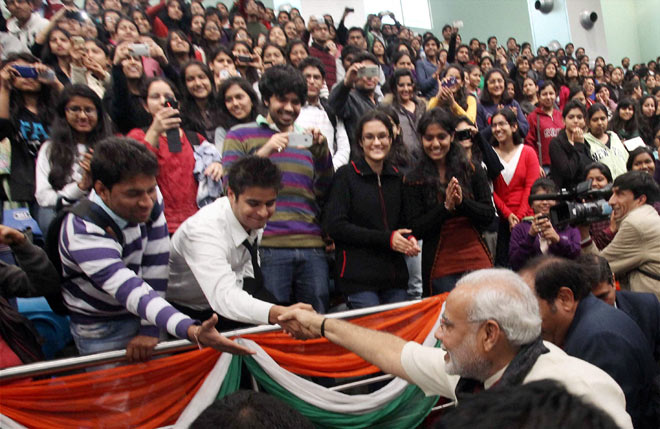The PM Modi led government is planning the biggest ever reform in the education sector. The regulation of Higher Education in India has long been inefficient as there are too many regulatory authorities to regulate Higher education. The UGC, which was created back in 1956 during Prime Minister Jawaharlal Nehru’s tenure, was set up with three major objectives to,
1) Regulate and coordinate higher education,
2) Disburse grants to universities and colleges and
3) Serve as a link between government (Central and State) and institutions of learning
The UGC, however, has failed in all these tasks. Now it’s become yet another aspect of the modern India’s socialist history like the planning commission. It is hurting both the growth of the education sector, as well as the quality of education of the youth simultaneously. There are other institutions like All India Council of Technical Education (AICTE), which was set up in 1945 to look after technical education. Thousands of unskilled and unemployed engineering students are a legacy of this agency’s failure.
Another such institution is National Council of Technical Education (NCTE). This authority was set up in 1993 to improve quality of teacher’s education and teaching research in the country. The presence of primary teachers who can’t even do basic math are prime example of how badly this institution has failed. It is very important to note at this point that all these regulatory institutions have functioning areas which overlap with each other. None of these institutions want their power to be reduced. This creates unnecessary hurdles for both the institutions as well as the students who suffer under this sort of red tape culture.
The previous committees set up by government like Yash Pal Committee and TSR Subramanian Committee had clearly outlined that existing regulatory authorities failed completely in the task of regulation. Subramanian Committee which filed its report in 2017 had suggested the creation of single body for all regulatory functions. Now the government will scrap all these existing institutions and bring new regulatory authority named as the Higher Education Evaluation and Regulation Authority (HEERA). This institution will look after all matters related to regulation of Higher Education. Funding will be largely vested with the HRD ministry which will release grants based on annual action plans presented by institutes.
HEERA will be tasked with suggesting possible grants to institutes based on itheir performance, which will ensure outcome-based funding rather than just throwing away money. The original idea for this agency was proposed by NITI Aayog. Since its inception, NITI Aayog has been able to bring sweeping reforms across many sectors. Earlier it played an instrumental role in bringing proposals for the National Testing Agency (NTA). NTA is tasked with conducting competitive exams like JEE and NEET. The idea of NTA was adopted from the United States.
The Human Resource Ministry is planning to bring HEERA bill in parliament by September 2018. The ten-member HEERA will have an academician as chairperson, who will be assisted by two Vice Chairpersons along with three members who have served at least five years as Directors of an IIT/IIM.
Recently we heard of a case in Uttarakhand where a medical college hiked their fees by upwards of 300 percent. The fee was increased from 5 lacks per annum to almost 20 lacks per annum. With this new regulation coming up, cases like this of arbitrary fee hikes would not take place.
